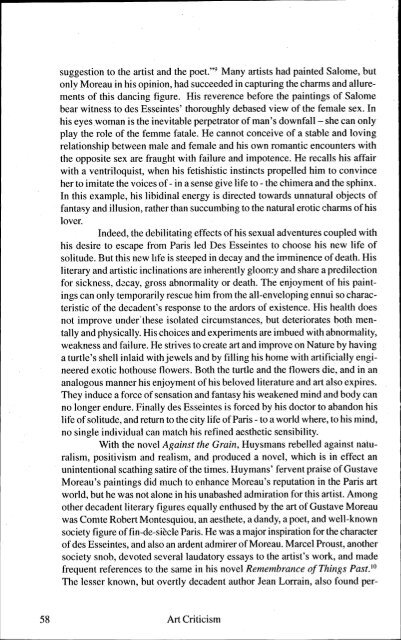Art Criticism - The State University of New York
Art Criticism - The State University of New York
Art Criticism - The State University of New York
You also want an ePaper? Increase the reach of your titles
YUMPU automatically turns print PDFs into web optimized ePapers that Google loves.
suggestion to the artist and the poet."9 Many artists had painted Salome, but<br />
only Moreau in his opinion, had succeeded in capturing the charms and allurements<br />
<strong>of</strong> this dancing figure. His reverence before the paintings <strong>of</strong> Salome<br />
bear witness to des Esseintes' thoroughly debased view <strong>of</strong> the female sex. In<br />
his eyes woman is the inevitable perpetrator <strong>of</strong> man's downfall- she can only<br />
play the role <strong>of</strong> the femme fatale. He cannot conceive <strong>of</strong> a stable and loving<br />
relationship between male and female and his own romantic encounters with<br />
the opposite sex are fraught with failure and impotence. He recalls his affair<br />
with a ventriloquist, when his fetishistic instincts propelled him to convince<br />
her to imitate the voices <strong>of</strong> - in a sense give life to - the chimera and the sphinx.<br />
In this example, his libidinal energy is directed towards unnatural objects <strong>of</strong><br />
fantasy and illusion, rather than succumbing to the natural erotic charms <strong>of</strong> his<br />
lover.<br />
Indeed, the debilitating effects <strong>of</strong> his sexual adventures coupled with<br />
his desire to escape from Paris led Des Esseintes to choose his new life <strong>of</strong><br />
solitude. But this new lIfe is steeped in decay and the imminence <strong>of</strong> death. His<br />
literary and artistic inclinations are inherently gloorr:y and share a predilection<br />
for sickness, d .. xay, gross abnormality or death. <strong>The</strong> enjoyment <strong>of</strong> his paintings<br />
can only temporarily rescue him from the all-enveloping ennui so characteristic<br />
<strong>of</strong> the decadent's response to the ardors <strong>of</strong> existence. His health does<br />
not improve under'these isolated circumstances, but deteriorates both mentally<br />
and physically. His choices and experiments are imbued with abnormality,<br />
weakness and failure, He strives to create art and improve on Nature by having<br />
a turtle's shell inlaid with jewels and by filling his home with artificially engineered<br />
exotic hothouse flowers. Both the turtle and the flowers die, and in an<br />
analogous manner his enjoyment <strong>of</strong> his beloved literature and art also expires.<br />
<strong>The</strong>y induce a force <strong>of</strong> sensation and fantasy his weakened mind and body can<br />
no longer endure. Finally des Esseintes is forced by his doctor to abandon his<br />
life <strong>of</strong> solitude, and return to the city life <strong>of</strong> Paris - to a world where, to his mind,<br />
no single individual can match his refined aesthetic sensibility.<br />
With the novel Against the Grain, Huysmans rebelled against naturalism,<br />
positivism and realism, and produced a novel, which is in effect an<br />
unintentional scathing satire <strong>of</strong> the times, Huymans' fervent praise <strong>of</strong> Gustave<br />
Moreau's paintings did much to enhance Moreau's reputation in the Paris art<br />
world, but he was not alone in his unabashed admiration for this artist. Among<br />
other decadent literary figures equally enthused by the art <strong>of</strong> Gustave Moreau<br />
was Comte Robert Montesquiou, an aesthete, a dandy, a poet, and well-known<br />
society figure <strong>of</strong> fin-de-siecle Paris. He was a major inspiration for the character<br />
<strong>of</strong> des Esseintes, and also an ardent admirer <strong>of</strong> Moreau. Marcel Proust, another<br />
society snob, devoted several laudatory essays to the artist's work, and made<br />
frequent references to the same in his novel Remembrance <strong>of</strong> Things Past,to<br />
<strong>The</strong> lesser known, but overtly decadent author Jean Lorrain, also found per-<br />
58<br />
<strong>Art</strong> <strong>Criticism</strong>
















